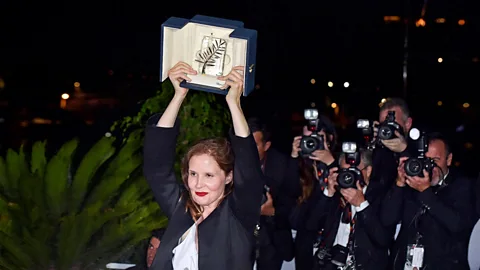By Louisa BallhausFeatures correspondent

 Netflix
Netflix
Non-English language films Anatomy of a Fall, The Zone of Interest, Past Lives, and Society of Snow all received Oscar nominations – three of them for best picture.
In 2020, Parasite made Oscars history as the first non-English language film to win best picture. Weeks earlier, director Bong Joon-ho had joked while accepting the Golden Globe for best foreign language film that “once you overcome the one-inch-tall barrier of subtitles, you’ll be introduced to so many amazing films”. Four years later, Academy voters seem to have taken Joon-ho’s advice, with more foreign-language films nominated for best picture than ever before.
More like this:
The 2023 best picture Oscar nominations saw two international, foreign-language films included in its nominees as well as one American but partially foreign-language production. While this may not seem like a striking figure, it’s a new record in the Academy’s 96-year history, in which no more than one foreign-language film has ever been nominated for best picture in any given year.

 Getty
Getty
Justine Triet’s Anatomy of a Fall, a French courtroom drama that debuted at Cannes, where it won the Palme d’Or, was nominated for best picture, as well as in four other categories, including best director and best original screenplay. Jonathan Glazer’s The Zone of Interest, a German-language, UK-produced Holocaust drama that also debuted at Cannes, earned a best picture nod as well as four additional nominations, including best director, best international feature film and best adapted screenplay. The best picture category this year also includes Celine Song’s Past Lives, a drama about lost love that plays out in both Korean and English.
Michael Schulman, author of Oscar Wars: A History of Hollywood in Gold, Sweat, and Tears, believes there are a few factors driving the rise in foreign-language films being nominated in major categories – one of those being the #OscarsSoWhite campaign that kicked off in 2015 as a hashtag started by activist and writer April Reign to protest the Academy’s failure to recognise the achievements of people of color across the industry.
“In the wake of #OscarsSoWhite in 2015 and 2016, the Academy made this huge effort to diversify and expand its membership,” Schulman tells BBC Culture. “And a lot of the attention went to the fact that they were bringing in more women, more people of color, and more younger voters. But there was also a real underappreciated push to get way more international members, and so the Academy is much more global now.”
New York Times awards season columnist Kyle Buchanan agrees, calling the increasingly international makeup of the Academy “a byproduct of the organisation’s drive to diversify itself in the wake of #OscarsSoWhite”.
“The Academy has invited a large swath of talent based outside the United States to join its ranks,” Buchanan tells BBC Culture. “And you can see their tastes reflected in a slate of nominees that stretch from Hollywood to beyond.”

 Le Pacte
Le Pacte
The word foreign – ‘foreign’ to whom? They felt like ‘international’ would be more inclusive and less of an American perspective – Michael Schulman
In other words, with a more global set of voters, you see a more global set of films being recognised for the Oscars’ highest honors, such as the best picture category. In the decades prior to this shift, non-English language films were nearly always relegated to the “best foreign language film” prize, a category that was retitled to “best international feature film” in 2019. Schulman notes that even the most influential non-English language films of the 20th century – including the works of Federico Fellini and Ingmar Bergman – almost never cracked the best picture category, with Bergman only once getting a single best picture nomination for Cries and Whispers in 1973.
Schulman believes the altered category name for best international feature film was another key sign of changing winds amid Academy voters: “The word ‘foreign’ – foreign to whom?” he asks. “They felt like ‘international’ would be more inclusive and less of an American perspective.”

 Netflix
Netflix
The globalising influence of streaming
In addition to the changing demographic of the Academy, streaming services such as Netflix have played a role in bringing foreign-language films to broader American audiences than ever before, a phenomenon seen with films including 2022’s All Quiet on the Western Front, a German World War One drama, and this year’s Society of the Snow, a Spanish film about the 1972 Andes plane crash. These films were both widely streamed and recognised with Oscar nominations, with All Quiet on the Western Front getting nine Oscar nods, including best picture, and Society of the Snow earning both a best international feature film and a best makeup and hairstyling nomination.
Society of Snow star Enzo Vogrincic previously spoke to BBC Culture about the importance of this Spanish-language film on a mainstream platform such as Netflix: “I think the fact that it’s told in Spanish changes everything,” he said, “because we who are from the area can really understand the story on a deeper level because the story is in us. We are born with the story.”
Schulman underlines the impact of UK and American viewers no longer having “to go to an arthouse movie theater to watch a movie in German – it was just on Netflix”. He also notes the symbiotic relationship that’s always existed between awards shows and popular interest. “Popular interest fuels Oscar nominations and then Oscar nominations and wins fuel audience interest. Something like All Quiet on the Western Front really caught on through Netflix – and then as [more] people heard about it through the Oscars, they could go watch it on Netflix.”
Americans are generally more accepting of subtitled films and TV shows than they ever have been before – Kyle Buchanan
Buchanan points to another Netflix hit, South Korean thriller series Squid Game, as evidence of growing American interest in foreign-language productions.
“Americans are generally more accepting of subtitled films and TV shows than they ever have been before,” Buchanan says. “Breakthrough global hits like Squid Game and Parasite have only hastened this process, and the segue to streaming services makes a wealth of international content far more accessible than it used to be.”
Both Buchanan and Schulman agree that, while the Academy’s changing makeup was set in motion years earlier, Parasite’s 2020 best picture win was still a pivotal moment in pushing non-English language films to the forefront in the US, as awards contenders and audience hits alike. Since that win, there’s been slow and steady progress in their Oscars representation. While only four foreign-language films were nominated for best picture between 2000 and 2018, at least one has been nominated in the category each year since Parasite: Minari in 2021, Drive My Car in 2022, All Quiet on the Western Front in 2023, and this year’s three foreign-language nominees.
“Parasite, like Moonlight, changed the perception of what a best picture looks like and what language it could be spoken in,” Schulman contends. “And I think that was a real shift.”
In years to come, expect the number of global hits at major awards shows to just keep growing. The Academy has crawled over the one-inch barrier of subtitles and they’re not looking back.
If you liked this story, sign up for The Essential List newsletter – a handpicked selection of features, videos and can’t-miss news delivered to your inbox every Friday.
If you would like to comment on this story or anything else you have seen on BBC Culture, head over to our Facebook page or message us on Twitter.





